Mental Health Awareness Issue of STEM Students in INCS: Program Basis
VerifiedAdded on 2022/10/03
|18
|4713
|65
Report
AI Summary
This research report investigates the mental health awareness of STEM students at Isabel National Comprehensive School (INCS). It uses a systems theory framework to understand the interconnected factors affecting students' mental well-being. The study aims to identify demographic profiles, pinpoint factors influencing mental health, and propose program interventions. The significance of the study lies in its potential benefit to teachers, students, parents, and future researchers by promoting awareness, providing support, and serving as a foundation for further investigation. Key terms such as mental health awareness, mental health, and intervention program are defined to provide a clear understanding of the research context. Ultimately, the research seeks to contribute to a more comprehensive approach to mental health within the school environment.
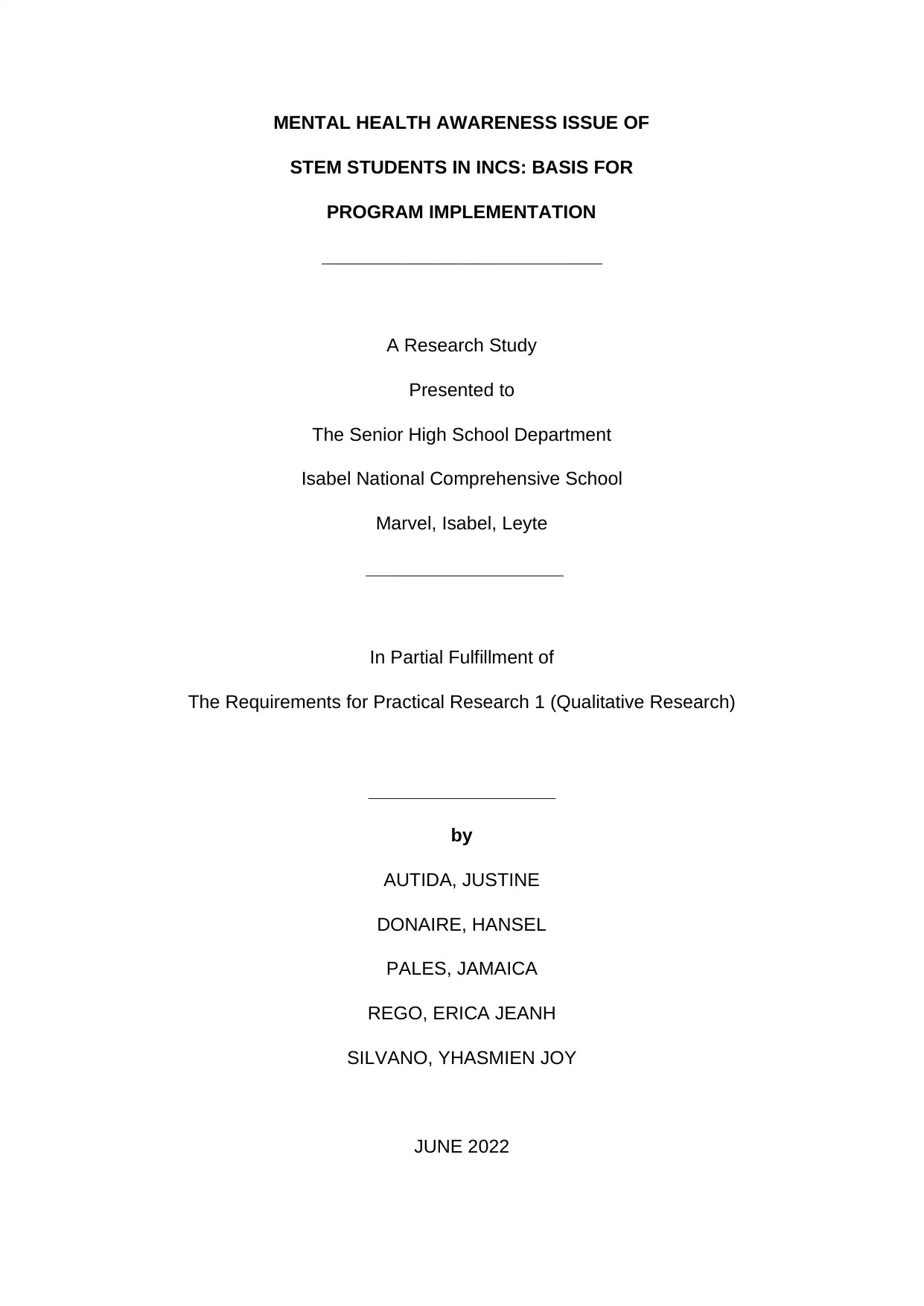
MENTAL HEALTH AWARENESS ISSUE OF
STEM STUDENTS IN INCS: BASIS FOR
PROGRAM IMPLEMENTATION
___________________________
A Research Study
Presented to
The Senior High School Department
Isabel National Comprehensive School
Marvel, Isabel, Leyte
___________________
In Partial Fulfillment of
The Requirements for Practical Research 1 (Qualitative Research)
__________________
by
AUTIDA, JUSTINE
DONAIRE, HANSEL
PALES, JAMAICA
REGO, ERICA JEANH
SILVANO, YHASMIEN JOY
JUNE 2022
STEM STUDENTS IN INCS: BASIS FOR
PROGRAM IMPLEMENTATION
___________________________
A Research Study
Presented to
The Senior High School Department
Isabel National Comprehensive School
Marvel, Isabel, Leyte
___________________
In Partial Fulfillment of
The Requirements for Practical Research 1 (Qualitative Research)
__________________
by
AUTIDA, JUSTINE
DONAIRE, HANSEL
PALES, JAMAICA
REGO, ERICA JEANH
SILVANO, YHASMIEN JOY
JUNE 2022
Paraphrase This Document
Need a fresh take? Get an instant paraphrase of this document with our AI Paraphraser
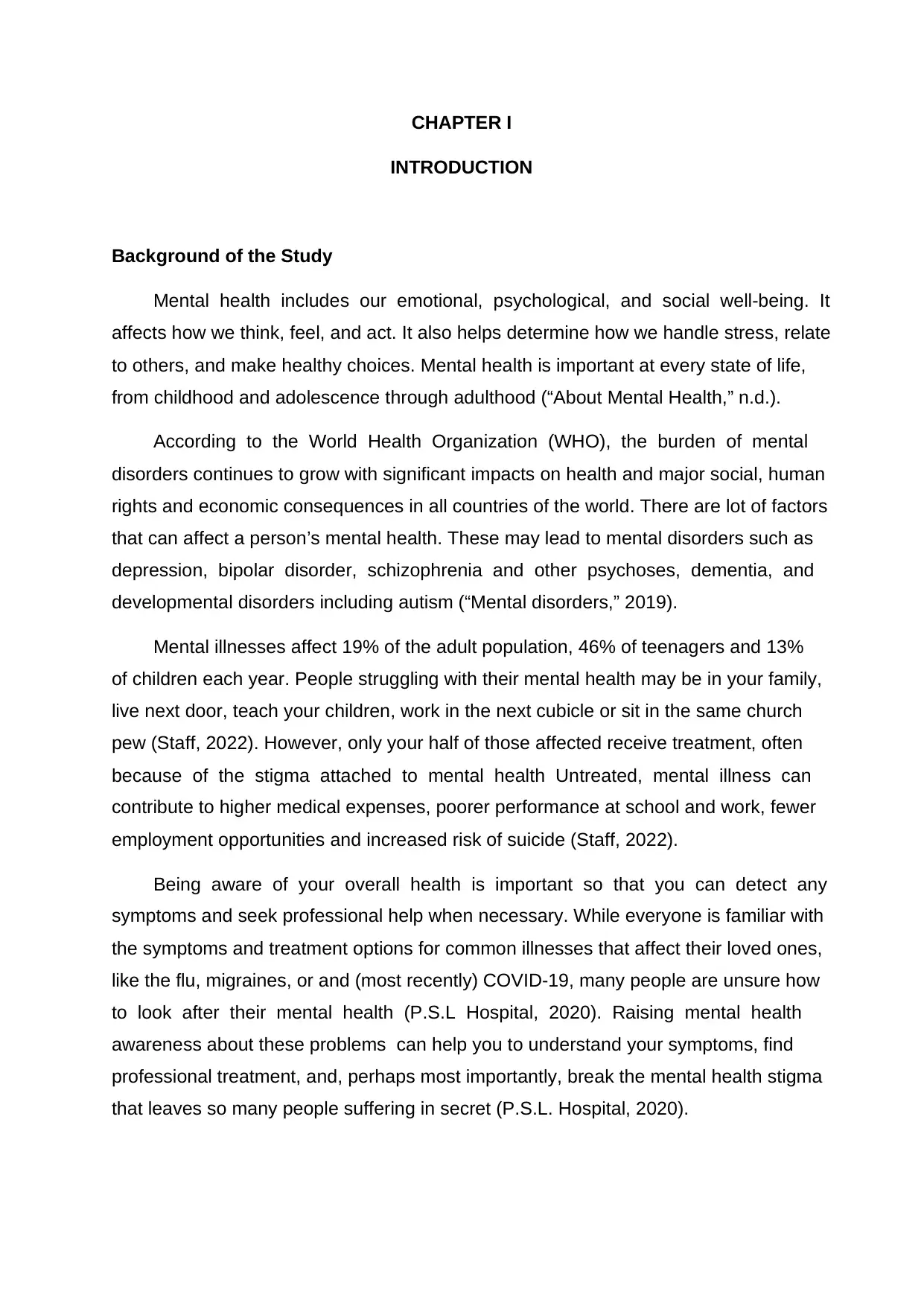
CHAPTER I
INTRODUCTION
Background of the Study
Mental health includes our emotional, psychological, and social well-being. It
affects how we think, feel, and act. It also helps determine how we handle stress, relate
to others, and make healthy choices. Mental health is important at every state of life,
from childhood and adolescence through adulthood (“About Mental Health,” n.d.).
According to the World Health Organization (WHO), the burden of mental
disorders continues to grow with significant impacts on health and major social, human
rights and economic consequences in all countries of the world. There are lot of factors
that can affect a person’s mental health. These may lead to mental disorders such as
depression, bipolar disorder, schizophrenia and other psychoses, dementia, and
developmental disorders including autism (“Mental disorders,” 2019).
Mental illnesses affect 19% of the adult population, 46% of teenagers and 13%
of children each year. People struggling with their mental health may be in your family,
live next door, teach your children, work in the next cubicle or sit in the same church
pew (Staff, 2022). However, only your half of those affected receive treatment, often
because of the stigma attached to mental health Untreated, mental illness can
contribute to higher medical expenses, poorer performance at school and work, fewer
employment opportunities and increased risk of suicide (Staff, 2022).
Being aware of your overall health is important so that you can detect any
symptoms and seek professional help when necessary. While everyone is familiar with
the symptoms and treatment options for common illnesses that affect their loved ones,
like the flu, migraines, or and (most recently) COVID-19, many people are unsure how
to look after their mental health (P.S.L Hospital, 2020). Raising mental health
awareness about these problems can help you to understand your symptoms, find
professional treatment, and, perhaps most importantly, break the mental health stigma
that leaves so many people suffering in secret (P.S.L. Hospital, 2020).
INTRODUCTION
Background of the Study
Mental health includes our emotional, psychological, and social well-being. It
affects how we think, feel, and act. It also helps determine how we handle stress, relate
to others, and make healthy choices. Mental health is important at every state of life,
from childhood and adolescence through adulthood (“About Mental Health,” n.d.).
According to the World Health Organization (WHO), the burden of mental
disorders continues to grow with significant impacts on health and major social, human
rights and economic consequences in all countries of the world. There are lot of factors
that can affect a person’s mental health. These may lead to mental disorders such as
depression, bipolar disorder, schizophrenia and other psychoses, dementia, and
developmental disorders including autism (“Mental disorders,” 2019).
Mental illnesses affect 19% of the adult population, 46% of teenagers and 13%
of children each year. People struggling with their mental health may be in your family,
live next door, teach your children, work in the next cubicle or sit in the same church
pew (Staff, 2022). However, only your half of those affected receive treatment, often
because of the stigma attached to mental health Untreated, mental illness can
contribute to higher medical expenses, poorer performance at school and work, fewer
employment opportunities and increased risk of suicide (Staff, 2022).
Being aware of your overall health is important so that you can detect any
symptoms and seek professional help when necessary. While everyone is familiar with
the symptoms and treatment options for common illnesses that affect their loved ones,
like the flu, migraines, or and (most recently) COVID-19, many people are unsure how
to look after their mental health (P.S.L Hospital, 2020). Raising mental health
awareness about these problems can help you to understand your symptoms, find
professional treatment, and, perhaps most importantly, break the mental health stigma
that leaves so many people suffering in secret (P.S.L. Hospital, 2020).
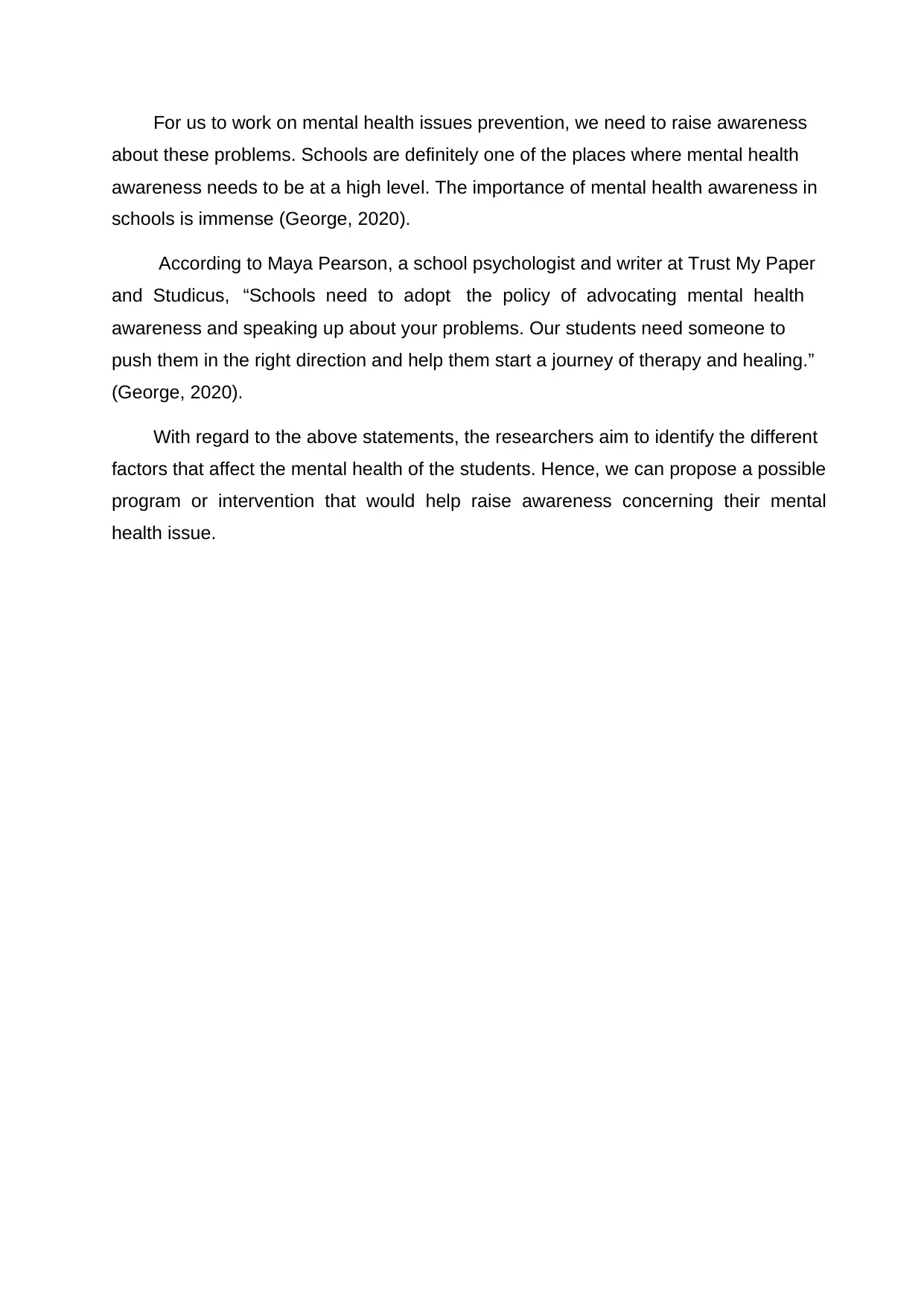
For us to work on mental health issues prevention, we need to raise awareness
about these problems. Schools are definitely one of the places where mental health
awareness needs to be at a high level. The importance of mental health awareness in
schools is immense (George, 2020).
According to Maya Pearson, a school psychologist and writer at Trust My Paper
and Studicus, “Schools need to adopt the policy of advocating mental health
awareness and speaking up about your problems. Our students need someone to
push them in the right direction and help them start a journey of therapy and healing.”
(George, 2020).
With regard to the above statements, the researchers aim to identify the different
factors that affect the mental health of the students. Hence, we can propose a possible
program or intervention that would help raise awareness concerning their mental
health issue.
about these problems. Schools are definitely one of the places where mental health
awareness needs to be at a high level. The importance of mental health awareness in
schools is immense (George, 2020).
According to Maya Pearson, a school psychologist and writer at Trust My Paper
and Studicus, “Schools need to adopt the policy of advocating mental health
awareness and speaking up about your problems. Our students need someone to
push them in the right direction and help them start a journey of therapy and healing.”
(George, 2020).
With regard to the above statements, the researchers aim to identify the different
factors that affect the mental health of the students. Hence, we can propose a possible
program or intervention that would help raise awareness concerning their mental
health issue.
⊘ This is a preview!⊘
Do you want full access?
Subscribe today to unlock all pages.

Trusted by 1+ million students worldwide
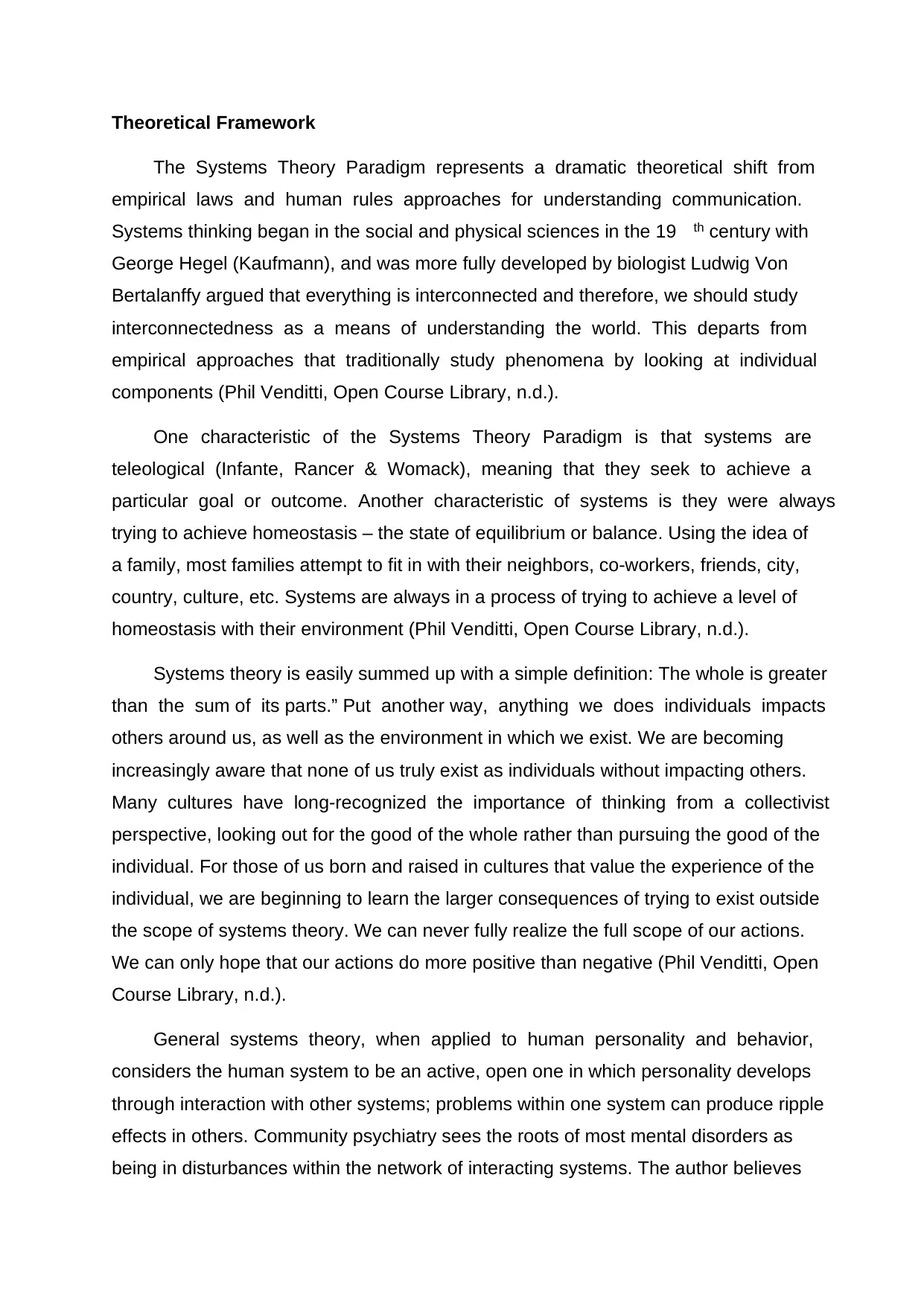
Theoretical Framework
The Systems Theory Paradigm represents a dramatic theoretical shift from
empirical laws and human rules approaches for understanding communication.
Systems thinking began in the social and physical sciences in the 19 th century with
George Hegel (Kaufmann), and was more fully developed by biologist Ludwig Von
Bertalanffy argued that everything is interconnected and therefore, we should study
interconnectedness as a means of understanding the world. This departs from
empirical approaches that traditionally study phenomena by looking at individual
components (Phil Venditti, Open Course Library, n.d.).
One characteristic of the Systems Theory Paradigm is that systems are
teleological (Infante, Rancer & Womack), meaning that they seek to achieve a
particular goal or outcome. Another characteristic of systems is they were always
trying to achieve homeostasis – the state of equilibrium or balance. Using the idea of
a family, most families attempt to fit in with their neighbors, co-workers, friends, city,
country, culture, etc. Systems are always in a process of trying to achieve a level of
homeostasis with their environment (Phil Venditti, Open Course Library, n.d.).
Systems theory is easily summed up with a simple definition: The whole is greater
than the sum of its parts.” Put another way, anything we does individuals impacts
others around us, as well as the environment in which we exist. We are becoming
increasingly aware that none of us truly exist as individuals without impacting others.
Many cultures have long-recognized the importance of thinking from a collectivist
perspective, looking out for the good of the whole rather than pursuing the good of the
individual. For those of us born and raised in cultures that value the experience of the
individual, we are beginning to learn the larger consequences of trying to exist outside
the scope of systems theory. We can never fully realize the full scope of our actions.
We can only hope that our actions do more positive than negative (Phil Venditti, Open
Course Library, n.d.).
General systems theory, when applied to human personality and behavior,
considers the human system to be an active, open one in which personality develops
through interaction with other systems; problems within one system can produce ripple
effects in others. Community psychiatry sees the roots of most mental disorders as
being in disturbances within the network of interacting systems. The author believes
The Systems Theory Paradigm represents a dramatic theoretical shift from
empirical laws and human rules approaches for understanding communication.
Systems thinking began in the social and physical sciences in the 19 th century with
George Hegel (Kaufmann), and was more fully developed by biologist Ludwig Von
Bertalanffy argued that everything is interconnected and therefore, we should study
interconnectedness as a means of understanding the world. This departs from
empirical approaches that traditionally study phenomena by looking at individual
components (Phil Venditti, Open Course Library, n.d.).
One characteristic of the Systems Theory Paradigm is that systems are
teleological (Infante, Rancer & Womack), meaning that they seek to achieve a
particular goal or outcome. Another characteristic of systems is they were always
trying to achieve homeostasis – the state of equilibrium or balance. Using the idea of
a family, most families attempt to fit in with their neighbors, co-workers, friends, city,
country, culture, etc. Systems are always in a process of trying to achieve a level of
homeostasis with their environment (Phil Venditti, Open Course Library, n.d.).
Systems theory is easily summed up with a simple definition: The whole is greater
than the sum of its parts.” Put another way, anything we does individuals impacts
others around us, as well as the environment in which we exist. We are becoming
increasingly aware that none of us truly exist as individuals without impacting others.
Many cultures have long-recognized the importance of thinking from a collectivist
perspective, looking out for the good of the whole rather than pursuing the good of the
individual. For those of us born and raised in cultures that value the experience of the
individual, we are beginning to learn the larger consequences of trying to exist outside
the scope of systems theory. We can never fully realize the full scope of our actions.
We can only hope that our actions do more positive than negative (Phil Venditti, Open
Course Library, n.d.).
General systems theory, when applied to human personality and behavior,
considers the human system to be an active, open one in which personality develops
through interaction with other systems; problems within one system can produce ripple
effects in others. Community psychiatry sees the roots of most mental disorders as
being in disturbances within the network of interacting systems. The author believes
Paraphrase This Document
Need a fresh take? Get an instant paraphrase of this document with our AI Paraphraser

that community mental health centers, with their multifaceted approach to treatment
and prevention, reflect the health profession’s efforts to deal with the mental health
problems of a community in a systems-oriented way (Marmor, 1975).
The significance of the General Systems Theory when it comes to mental health
awareness issues, is that everything around us, would lead to different factors
affecting our mental health. Combining those factors together, might result in whatever
type of mental state we have. For short, it is somehow like a cause and effect
relationship. An impact resulting in another impact. To achieve balance, we must attain
a goal in promoting a mental health awareness intervention. The way our mental
health impacts our lives, it also impacts every other person we interact with. If we want
a healthy outcome, we must work on it.
and prevention, reflect the health profession’s efforts to deal with the mental health
problems of a community in a systems-oriented way (Marmor, 1975).
The significance of the General Systems Theory when it comes to mental health
awareness issues, is that everything around us, would lead to different factors
affecting our mental health. Combining those factors together, might result in whatever
type of mental state we have. For short, it is somehow like a cause and effect
relationship. An impact resulting in another impact. To achieve balance, we must attain
a goal in promoting a mental health awareness intervention. The way our mental
health impacts our lives, it also impacts every other person we interact with. If we want
a healthy outcome, we must work on it.
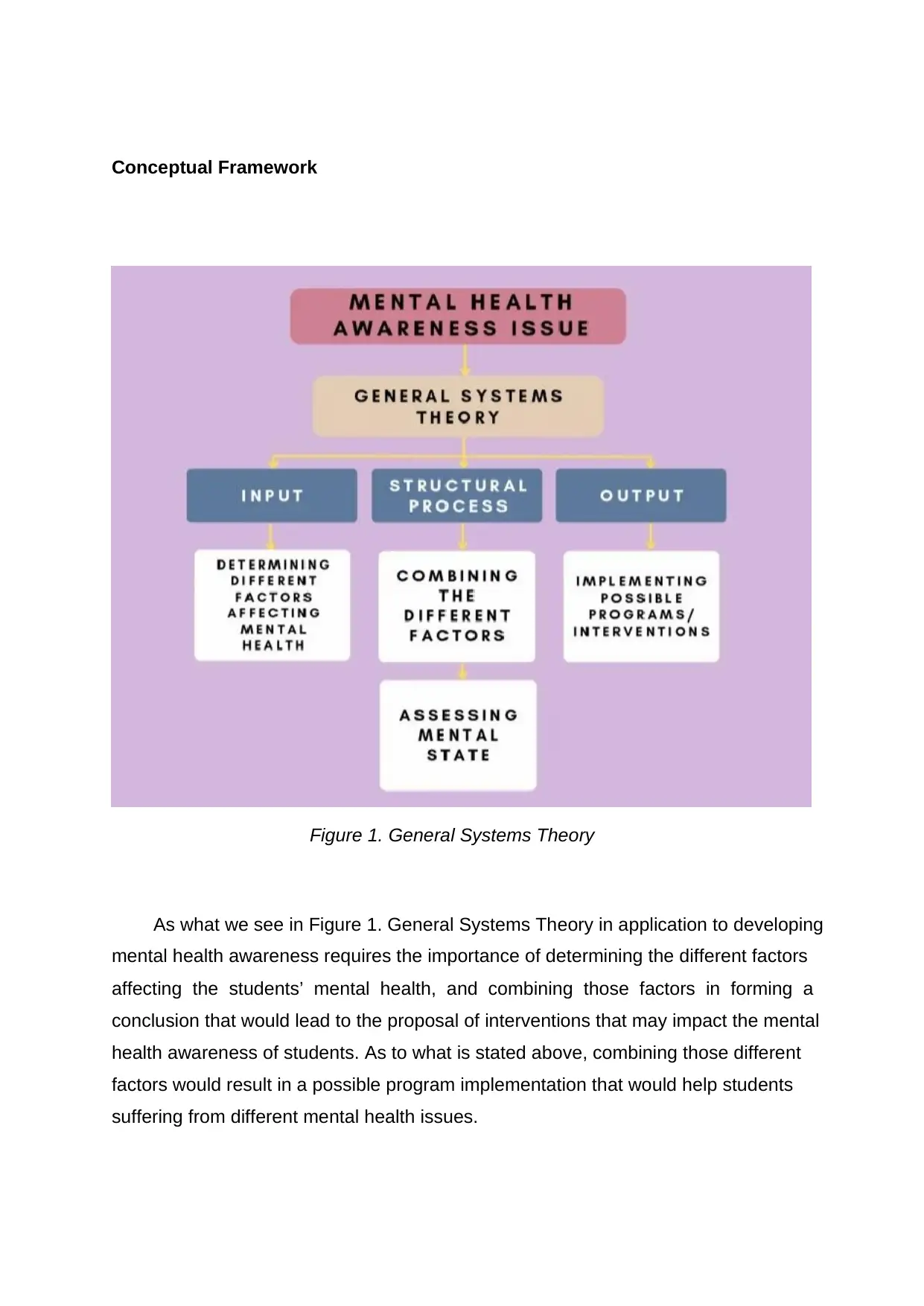
Conceptual Framework
Figure 1. General Systems Theory
As what we see in Figure 1. General Systems Theory in application to developing
mental health awareness requires the importance of determining the different factors
affecting the students’ mental health, and combining those factors in forming a
conclusion that would lead to the proposal of interventions that may impact the mental
health awareness of students. As to what is stated above, combining those different
factors would result in a possible program implementation that would help students
suffering from different mental health issues.
Figure 1. General Systems Theory
As what we see in Figure 1. General Systems Theory in application to developing
mental health awareness requires the importance of determining the different factors
affecting the students’ mental health, and combining those factors in forming a
conclusion that would lead to the proposal of interventions that may impact the mental
health awareness of students. As to what is stated above, combining those different
factors would result in a possible program implementation that would help students
suffering from different mental health issues.
⊘ This is a preview!⊘
Do you want full access?
Subscribe today to unlock all pages.

Trusted by 1+ million students worldwide
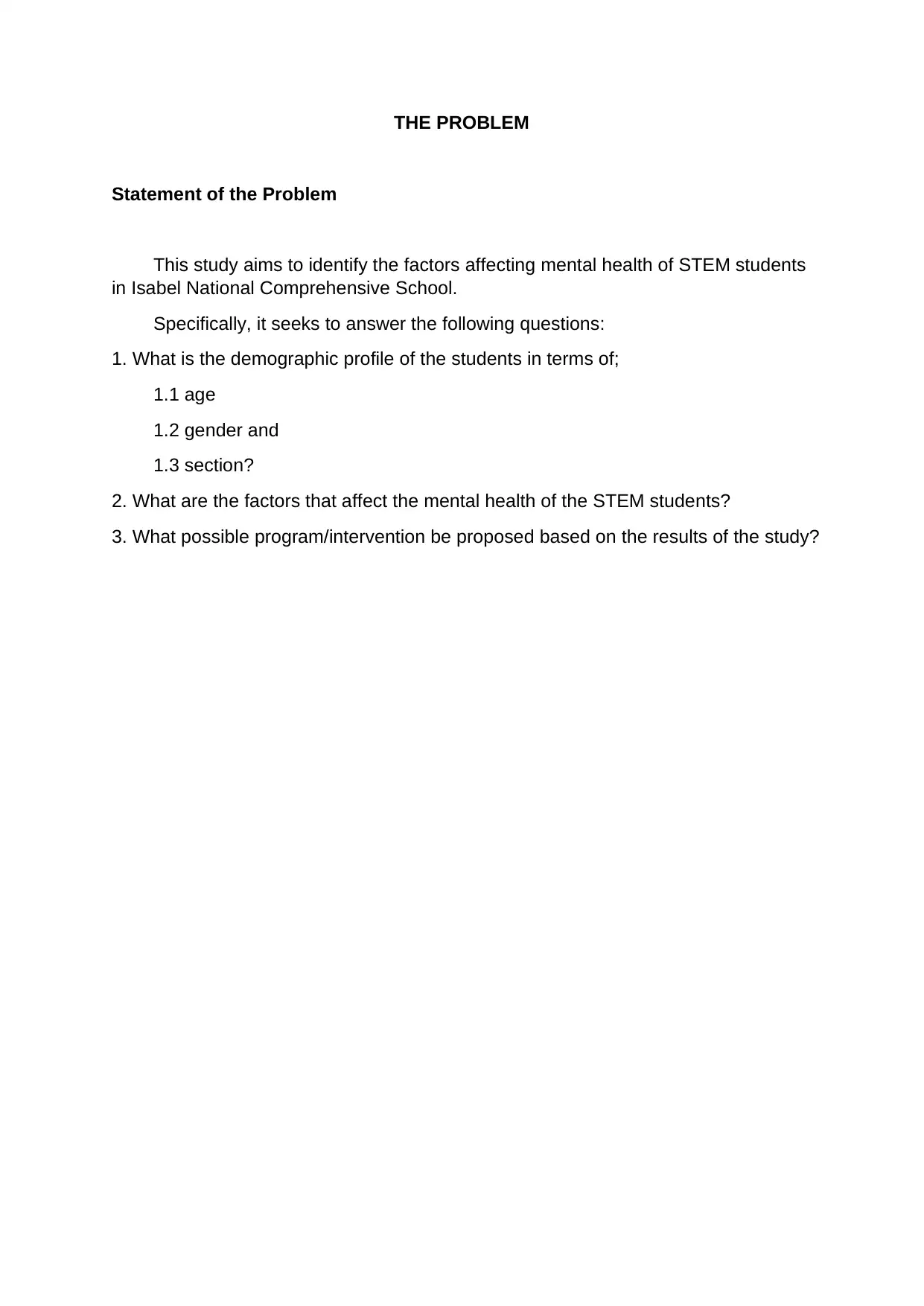
THE PROBLEM
Statement of the Problem
This study aims to identify the factors affecting mental health of STEM students
in Isabel National Comprehensive School.
Specifically, it seeks to answer the following questions:
1. What is the demographic profile of the students in terms of;
1.1 age
1.2 gender and
1.3 section?
2. What are the factors that affect the mental health of the STEM students?
3. What possible program/intervention be proposed based on the results of the study?
Statement of the Problem
This study aims to identify the factors affecting mental health of STEM students
in Isabel National Comprehensive School.
Specifically, it seeks to answer the following questions:
1. What is the demographic profile of the students in terms of;
1.1 age
1.2 gender and
1.3 section?
2. What are the factors that affect the mental health of the STEM students?
3. What possible program/intervention be proposed based on the results of the study?
Paraphrase This Document
Need a fresh take? Get an instant paraphrase of this document with our AI Paraphraser
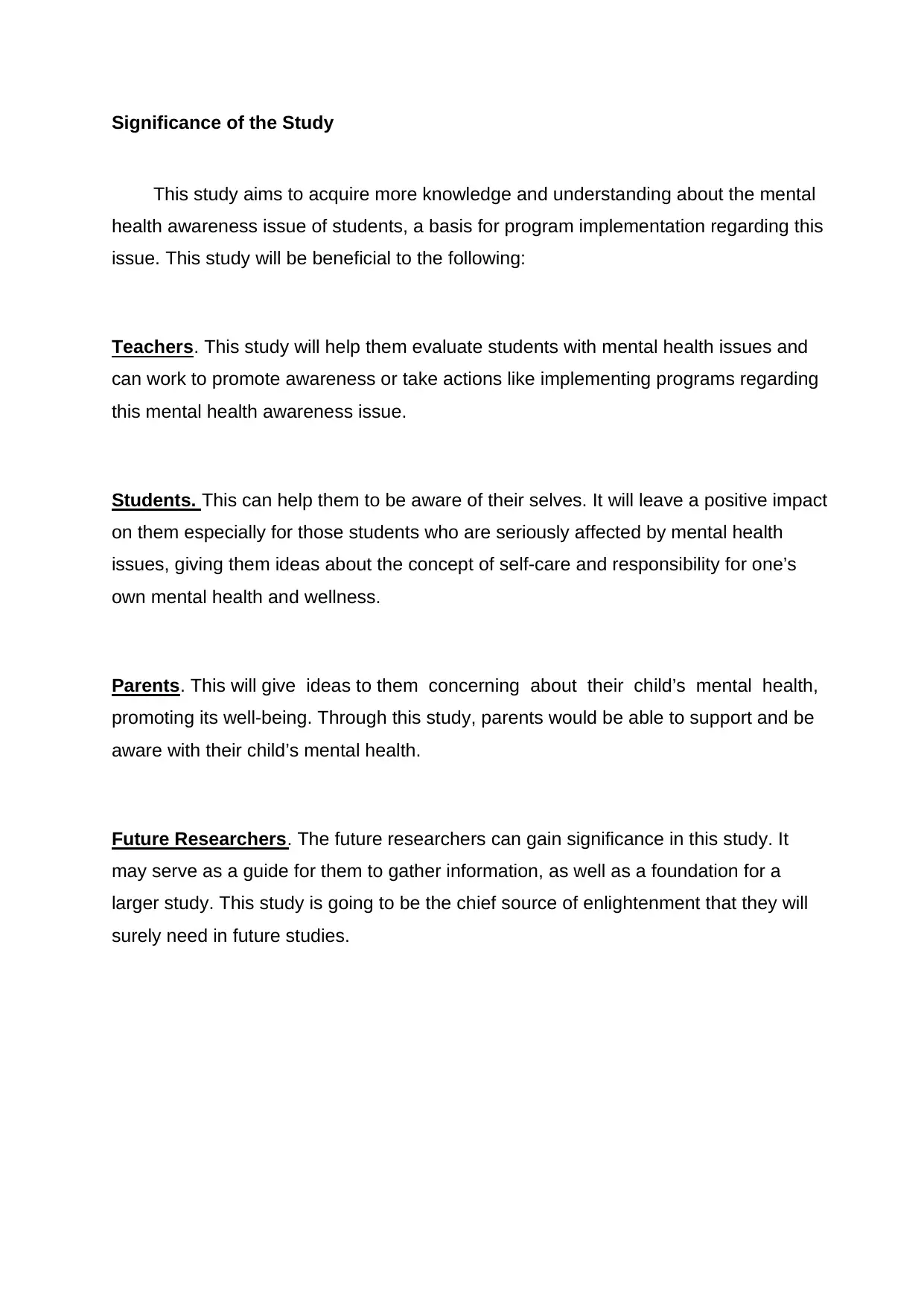
Significance of the Study
This study aims to acquire more knowledge and understanding about the mental
health awareness issue of students, a basis for program implementation regarding this
issue. This study will be beneficial to the following:
Teachers. This study will help them evaluate students with mental health issues and
can work to promote awareness or take actions like implementing programs regarding
this mental health awareness issue.
Students. This can help them to be aware of their selves. It will leave a positive impact
on them especially for those students who are seriously affected by mental health
issues, giving them ideas about the concept of self-care and responsibility for one’s
own mental health and wellness.
Parents. This will give ideas to them concerning about their child’s mental health,
promoting its well-being. Through this study, parents would be able to support and be
aware with their child’s mental health.
Future Researchers. The future researchers can gain significance in this study. It
may serve as a guide for them to gather information, as well as a foundation for a
larger study. This study is going to be the chief source of enlightenment that they will
surely need in future studies.
This study aims to acquire more knowledge and understanding about the mental
health awareness issue of students, a basis for program implementation regarding this
issue. This study will be beneficial to the following:
Teachers. This study will help them evaluate students with mental health issues and
can work to promote awareness or take actions like implementing programs regarding
this mental health awareness issue.
Students. This can help them to be aware of their selves. It will leave a positive impact
on them especially for those students who are seriously affected by mental health
issues, giving them ideas about the concept of self-care and responsibility for one’s
own mental health and wellness.
Parents. This will give ideas to them concerning about their child’s mental health,
promoting its well-being. Through this study, parents would be able to support and be
aware with their child’s mental health.
Future Researchers. The future researchers can gain significance in this study. It
may serve as a guide for them to gather information, as well as a foundation for a
larger study. This study is going to be the chief source of enlightenment that they will
surely need in future studies.
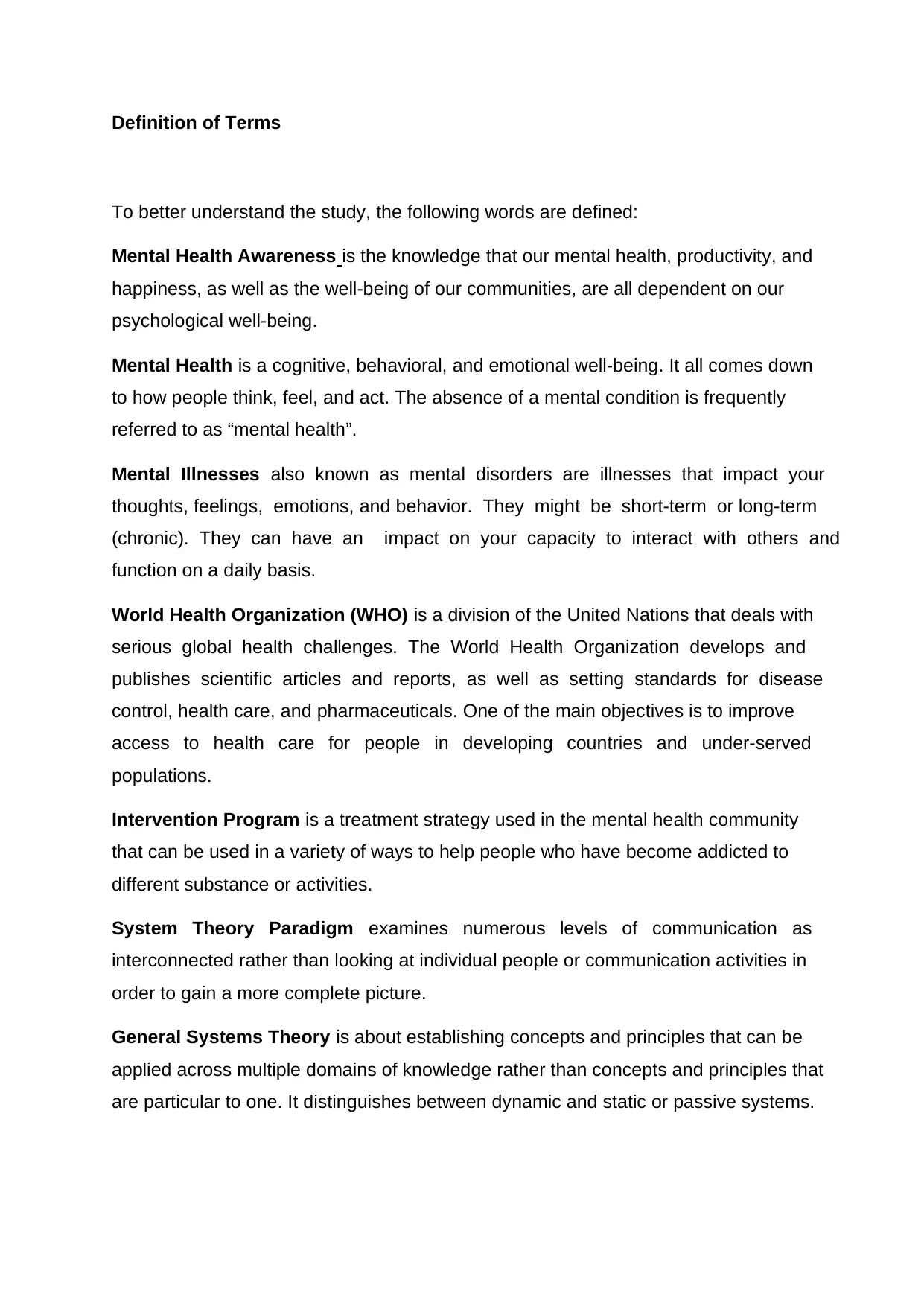
Definition of Terms
To better understand the study, the following words are defined:
Mental Health Awareness is the knowledge that our mental health, productivity, and
happiness, as well as the well-being of our communities, are all dependent on our
psychological well-being.
Mental Health is a cognitive, behavioral, and emotional well-being. It all comes down
to how people think, feel, and act. The absence of a mental condition is frequently
referred to as “mental health”.
Mental Illnesses also known as mental disorders are illnesses that impact your
thoughts, feelings, emotions, and behavior. They might be short-term or long-term
(chronic). They can have an impact on your capacity to interact with others and
function on a daily basis.
World Health Organization (WHO) is a division of the United Nations that deals with
serious global health challenges. The World Health Organization develops and
publishes scientific articles and reports, as well as setting standards for disease
control, health care, and pharmaceuticals. One of the main objectives is to improve
access to health care for people in developing countries and under-served
populations.
Intervention Program is a treatment strategy used in the mental health community
that can be used in a variety of ways to help people who have become addicted to
different substance or activities.
System Theory Paradigm examines numerous levels of communication as
interconnected rather than looking at individual people or communication activities in
order to gain a more complete picture.
General Systems Theory is about establishing concepts and principles that can be
applied across multiple domains of knowledge rather than concepts and principles that
are particular to one. It distinguishes between dynamic and static or passive systems.
To better understand the study, the following words are defined:
Mental Health Awareness is the knowledge that our mental health, productivity, and
happiness, as well as the well-being of our communities, are all dependent on our
psychological well-being.
Mental Health is a cognitive, behavioral, and emotional well-being. It all comes down
to how people think, feel, and act. The absence of a mental condition is frequently
referred to as “mental health”.
Mental Illnesses also known as mental disorders are illnesses that impact your
thoughts, feelings, emotions, and behavior. They might be short-term or long-term
(chronic). They can have an impact on your capacity to interact with others and
function on a daily basis.
World Health Organization (WHO) is a division of the United Nations that deals with
serious global health challenges. The World Health Organization develops and
publishes scientific articles and reports, as well as setting standards for disease
control, health care, and pharmaceuticals. One of the main objectives is to improve
access to health care for people in developing countries and under-served
populations.
Intervention Program is a treatment strategy used in the mental health community
that can be used in a variety of ways to help people who have become addicted to
different substance or activities.
System Theory Paradigm examines numerous levels of communication as
interconnected rather than looking at individual people or communication activities in
order to gain a more complete picture.
General Systems Theory is about establishing concepts and principles that can be
applied across multiple domains of knowledge rather than concepts and principles that
are particular to one. It distinguishes between dynamic and static or passive systems.
⊘ This is a preview!⊘
Do you want full access?
Subscribe today to unlock all pages.

Trusted by 1+ million students worldwide
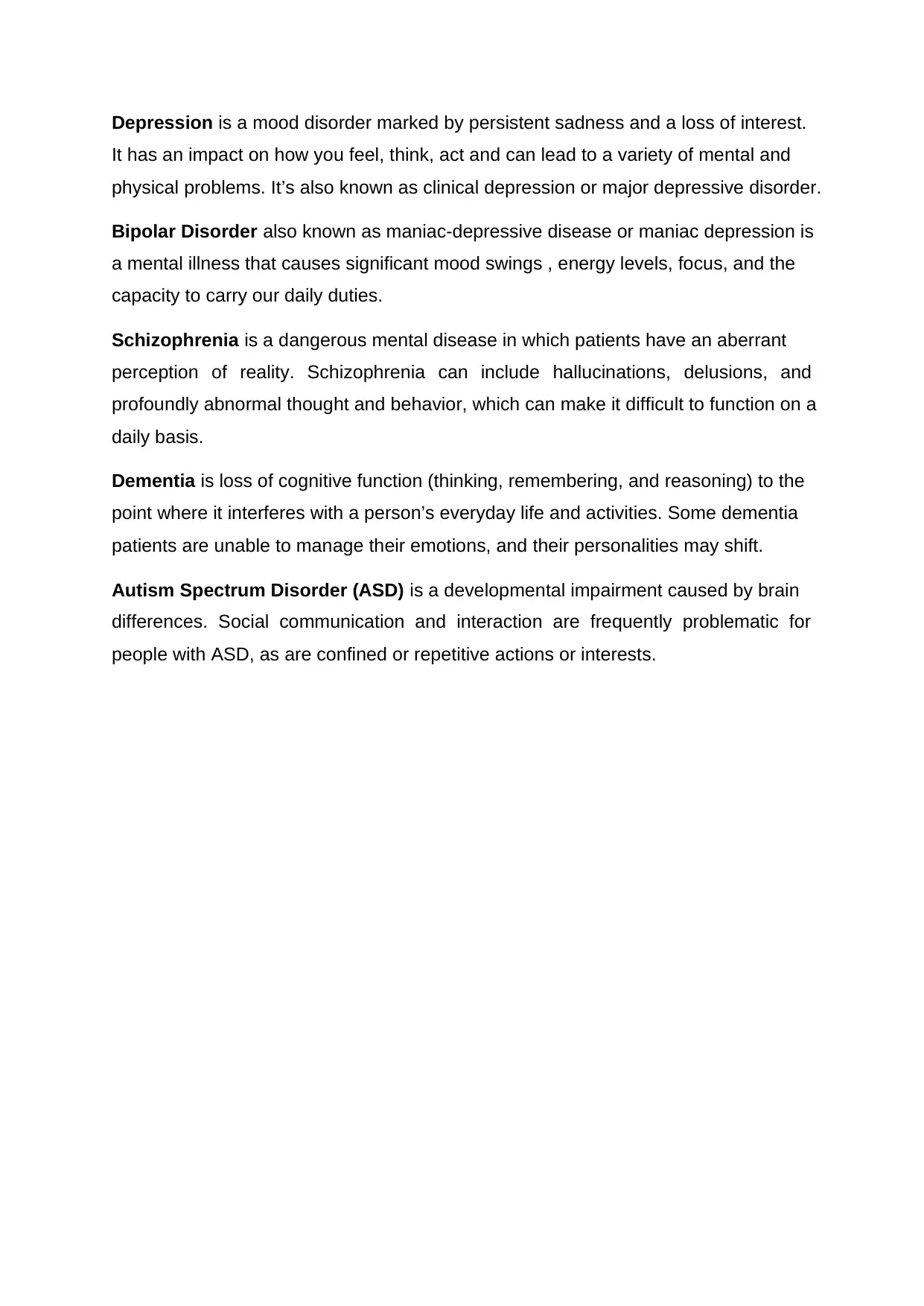
Depression is a mood disorder marked by persistent sadness and a loss of interest.
It has an impact on how you feel, think, act and can lead to a variety of mental and
physical problems. It’s also known as clinical depression or major depressive disorder.
Bipolar Disorder also known as maniac-depressive disease or maniac depression is
a mental illness that causes significant mood swings , energy levels, focus, and the
capacity to carry our daily duties.
Schizophrenia is a dangerous mental disease in which patients have an aberrant
perception of reality. Schizophrenia can include hallucinations, delusions, and
profoundly abnormal thought and behavior, which can make it difficult to function on a
daily basis.
Dementia is loss of cognitive function (thinking, remembering, and reasoning) to the
point where it interferes with a person’s everyday life and activities. Some dementia
patients are unable to manage their emotions, and their personalities may shift.
Autism Spectrum Disorder (ASD) is a developmental impairment caused by brain
differences. Social communication and interaction are frequently problematic for
people with ASD, as are confined or repetitive actions or interests.
It has an impact on how you feel, think, act and can lead to a variety of mental and
physical problems. It’s also known as clinical depression or major depressive disorder.
Bipolar Disorder also known as maniac-depressive disease or maniac depression is
a mental illness that causes significant mood swings , energy levels, focus, and the
capacity to carry our daily duties.
Schizophrenia is a dangerous mental disease in which patients have an aberrant
perception of reality. Schizophrenia can include hallucinations, delusions, and
profoundly abnormal thought and behavior, which can make it difficult to function on a
daily basis.
Dementia is loss of cognitive function (thinking, remembering, and reasoning) to the
point where it interferes with a person’s everyday life and activities. Some dementia
patients are unable to manage their emotions, and their personalities may shift.
Autism Spectrum Disorder (ASD) is a developmental impairment caused by brain
differences. Social communication and interaction are frequently problematic for
people with ASD, as are confined or repetitive actions or interests.
Paraphrase This Document
Need a fresh take? Get an instant paraphrase of this document with our AI Paraphraser
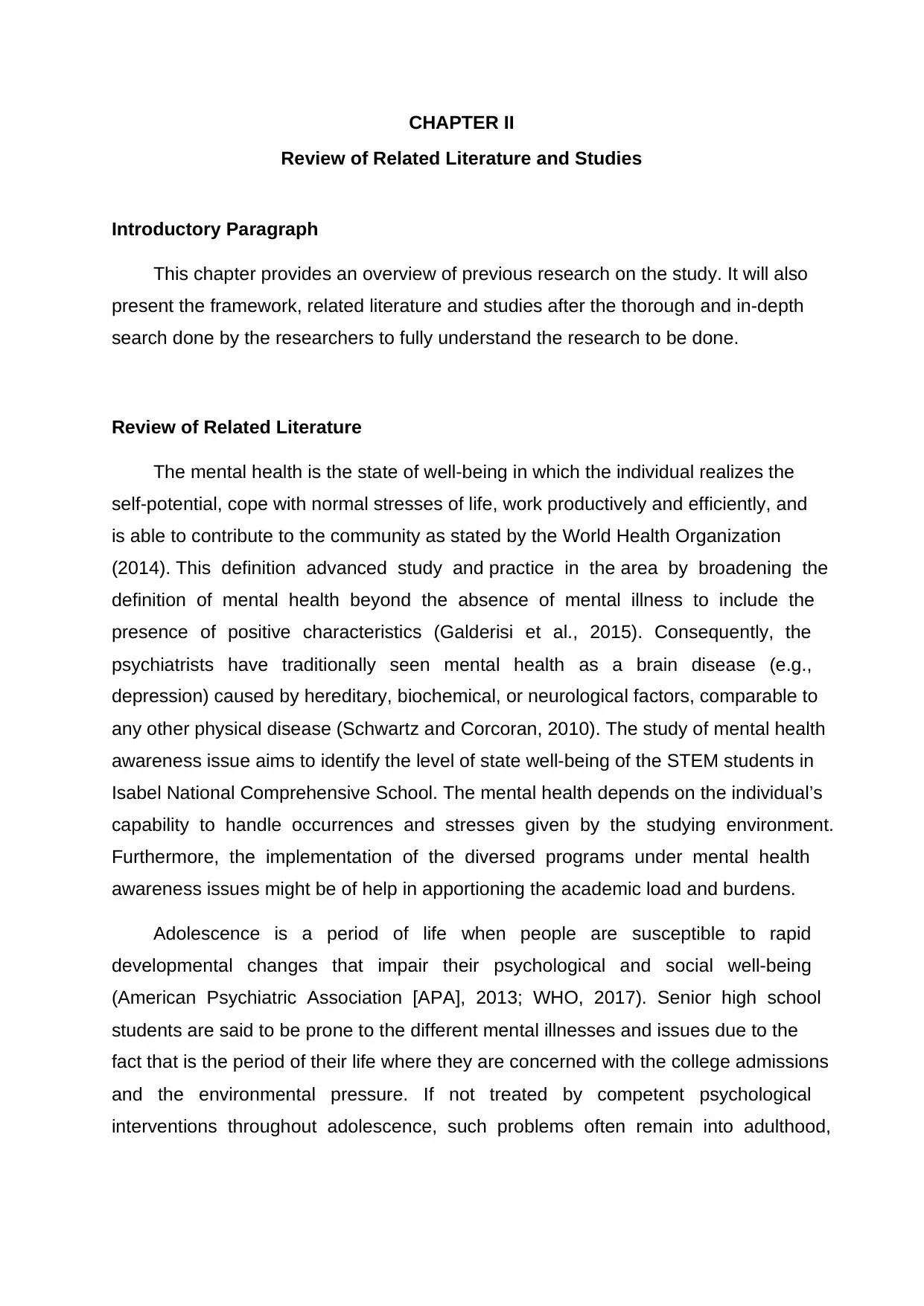
CHAPTER II
Review of Related Literature and Studies
Introductory Paragraph
This chapter provides an overview of previous research on the study. It will also
present the framework, related literature and studies after the thorough and in-depth
search done by the researchers to fully understand the research to be done.
Review of Related Literature
The mental health is the state of well-being in which the individual realizes the
self-potential, cope with normal stresses of life, work productively and efficiently, and
is able to contribute to the community as stated by the World Health Organization
(2014). This definition advanced study and practice in the area by broadening the
definition of mental health beyond the absence of mental illness to include the
presence of positive characteristics (Galderisi et al., 2015). Consequently, the
psychiatrists have traditionally seen mental health as a brain disease (e.g.,
depression) caused by hereditary, biochemical, or neurological factors, comparable to
any other physical disease (Schwartz and Corcoran, 2010). The study of mental health
awareness issue aims to identify the level of state well-being of the STEM students in
Isabel National Comprehensive School. The mental health depends on the individual’s
capability to handle occurrences and stresses given by the studying environment.
Furthermore, the implementation of the diversed programs under mental health
awareness issues might be of help in apportioning the academic load and burdens.
Adolescence is a period of life when people are susceptible to rapid
developmental changes that impair their psychological and social well-being
(American Psychiatric Association [APA], 2013; WHO, 2017). Senior high school
students are said to be prone to the different mental illnesses and issues due to the
fact that is the period of their life where they are concerned with the college admissions
and the environmental pressure. If not treated by competent psychological
interventions throughout adolescence, such problems often remain into adulthood,
Review of Related Literature and Studies
Introductory Paragraph
This chapter provides an overview of previous research on the study. It will also
present the framework, related literature and studies after the thorough and in-depth
search done by the researchers to fully understand the research to be done.
Review of Related Literature
The mental health is the state of well-being in which the individual realizes the
self-potential, cope with normal stresses of life, work productively and efficiently, and
is able to contribute to the community as stated by the World Health Organization
(2014). This definition advanced study and practice in the area by broadening the
definition of mental health beyond the absence of mental illness to include the
presence of positive characteristics (Galderisi et al., 2015). Consequently, the
psychiatrists have traditionally seen mental health as a brain disease (e.g.,
depression) caused by hereditary, biochemical, or neurological factors, comparable to
any other physical disease (Schwartz and Corcoran, 2010). The study of mental health
awareness issue aims to identify the level of state well-being of the STEM students in
Isabel National Comprehensive School. The mental health depends on the individual’s
capability to handle occurrences and stresses given by the studying environment.
Furthermore, the implementation of the diversed programs under mental health
awareness issues might be of help in apportioning the academic load and burdens.
Adolescence is a period of life when people are susceptible to rapid
developmental changes that impair their psychological and social well-being
(American Psychiatric Association [APA], 2013; WHO, 2017). Senior high school
students are said to be prone to the different mental illnesses and issues due to the
fact that is the period of their life where they are concerned with the college admissions
and the environmental pressure. If not treated by competent psychological
interventions throughout adolescence, such problems often remain into adulthood,
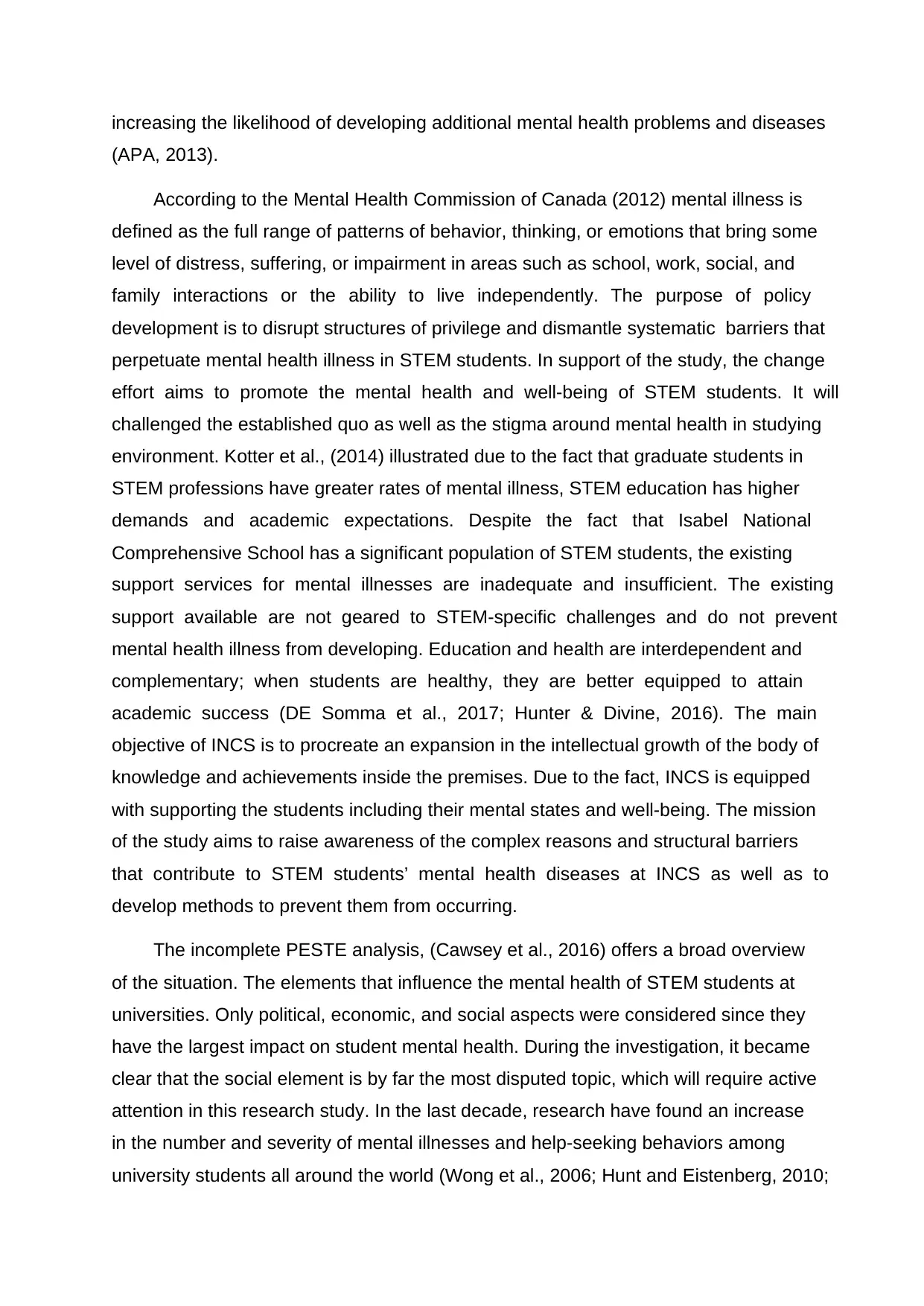
increasing the likelihood of developing additional mental health problems and diseases
(APA, 2013).
According to the Mental Health Commission of Canada (2012) mental illness is
defined as the full range of patterns of behavior, thinking, or emotions that bring some
level of distress, suffering, or impairment in areas such as school, work, social, and
family interactions or the ability to live independently. The purpose of policy
development is to disrupt structures of privilege and dismantle systematic barriers that
perpetuate mental health illness in STEM students. In support of the study, the change
effort aims to promote the mental health and well-being of STEM students. It will
challenged the established quo as well as the stigma around mental health in studying
environment. Kotter et al., (2014) illustrated due to the fact that graduate students in
STEM professions have greater rates of mental illness, STEM education has higher
demands and academic expectations. Despite the fact that Isabel National
Comprehensive School has a significant population of STEM students, the existing
support services for mental illnesses are inadequate and insufficient. The existing
support available are not geared to STEM-specific challenges and do not prevent
mental health illness from developing. Education and health are interdependent and
complementary; when students are healthy, they are better equipped to attain
academic success (DE Somma et al., 2017; Hunter & Divine, 2016). The main
objective of INCS is to procreate an expansion in the intellectual growth of the body of
knowledge and achievements inside the premises. Due to the fact, INCS is equipped
with supporting the students including their mental states and well-being. The mission
of the study aims to raise awareness of the complex reasons and structural barriers
that contribute to STEM students’ mental health diseases at INCS as well as to
develop methods to prevent them from occurring.
The incomplete PESTE analysis, (Cawsey et al., 2016) offers a broad overview
of the situation. The elements that influence the mental health of STEM students at
universities. Only political, economic, and social aspects were considered since they
have the largest impact on student mental health. During the investigation, it became
clear that the social element is by far the most disputed topic, which will require active
attention in this research study. In the last decade, research have found an increase
in the number and severity of mental illnesses and help-seeking behaviors among
university students all around the world (Wong et al., 2006; Hunt and Eistenberg, 2010;
(APA, 2013).
According to the Mental Health Commission of Canada (2012) mental illness is
defined as the full range of patterns of behavior, thinking, or emotions that bring some
level of distress, suffering, or impairment in areas such as school, work, social, and
family interactions or the ability to live independently. The purpose of policy
development is to disrupt structures of privilege and dismantle systematic barriers that
perpetuate mental health illness in STEM students. In support of the study, the change
effort aims to promote the mental health and well-being of STEM students. It will
challenged the established quo as well as the stigma around mental health in studying
environment. Kotter et al., (2014) illustrated due to the fact that graduate students in
STEM professions have greater rates of mental illness, STEM education has higher
demands and academic expectations. Despite the fact that Isabel National
Comprehensive School has a significant population of STEM students, the existing
support services for mental illnesses are inadequate and insufficient. The existing
support available are not geared to STEM-specific challenges and do not prevent
mental health illness from developing. Education and health are interdependent and
complementary; when students are healthy, they are better equipped to attain
academic success (DE Somma et al., 2017; Hunter & Divine, 2016). The main
objective of INCS is to procreate an expansion in the intellectual growth of the body of
knowledge and achievements inside the premises. Due to the fact, INCS is equipped
with supporting the students including their mental states and well-being. The mission
of the study aims to raise awareness of the complex reasons and structural barriers
that contribute to STEM students’ mental health diseases at INCS as well as to
develop methods to prevent them from occurring.
The incomplete PESTE analysis, (Cawsey et al., 2016) offers a broad overview
of the situation. The elements that influence the mental health of STEM students at
universities. Only political, economic, and social aspects were considered since they
have the largest impact on student mental health. During the investigation, it became
clear that the social element is by far the most disputed topic, which will require active
attention in this research study. In the last decade, research have found an increase
in the number and severity of mental illnesses and help-seeking behaviors among
university students all around the world (Wong et al., 2006; Hunt and Eistenberg, 2010;
⊘ This is a preview!⊘
Do you want full access?
Subscribe today to unlock all pages.

Trusted by 1+ million students worldwide
1 out of 18
Related Documents
Your All-in-One AI-Powered Toolkit for Academic Success.
+13062052269
info@desklib.com
Available 24*7 on WhatsApp / Email
![[object Object]](/_next/static/media/star-bottom.7253800d.svg)
Unlock your academic potential
Copyright © 2020–2026 A2Z Services. All Rights Reserved. Developed and managed by ZUCOL.




